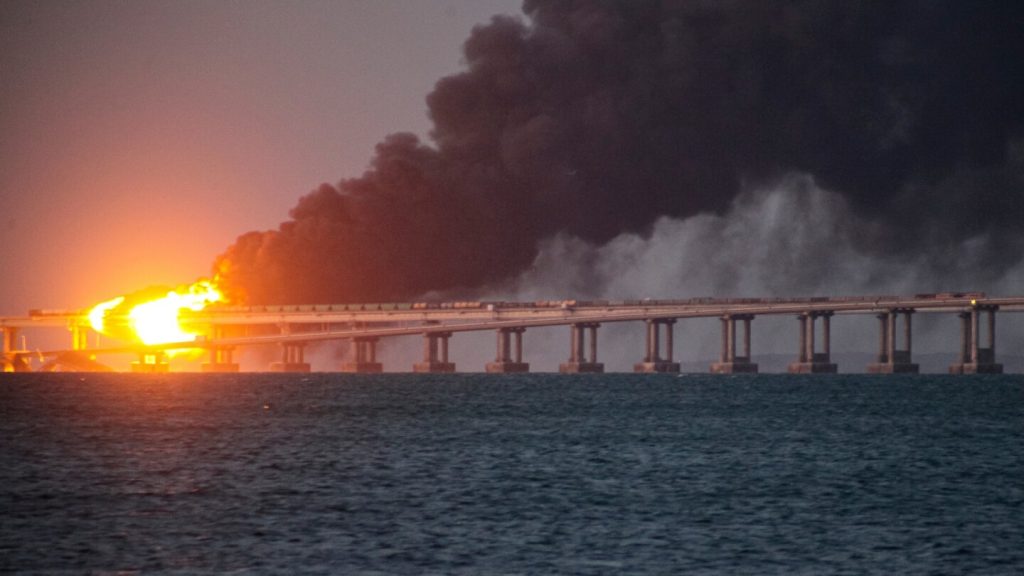A court in Russia on Thursday convicted eight people on terrorism charges over an attack on a bridge linking Russia to Moscow-annexed Crimea that is a key supply route for Kremlin forces in the war with Ukraine.
The court sentenced all of the defendants to life in prison.
The October 2022 attack on the bridge came when a truck bomb blew up two of its sections and required months of repairs. The blast killed the truck driver and four other people in a car nearby. Moscow decried the attack as an act of terrorism and retaliated by bombarding Ukraine’s civilian infrastructure, targeting the country’s power grid over the winter.
The Ukrainian Security Service, known as the SBU, claimed responsibility for the attack.
Eight people including Russian, Ukrainian and Armenian citizens were arrested. Five others, including three Ukrainian and two Georgian nationals, were charged in absentia.
Artyom and Georgy Azatyan, Oleg Antipov, Alexander Bylin, Vladimir Zloba, Dmitry Tyazhelykh, Roman Solomko and Artur Terchanyan were charged with carrying out a terrorist attack and illegal arms trafficking. Solomko and Terchanyan also were accused of smuggling explosives.
The Russian authorities accused them of aiding Ukraine in organizing the attack. All of those arrested have denied the charges and insisted they didn’t know the truck carried explosives, according to Russian media reports.
Lt. Gen. Vasyl Maliuk, head of the SBU, said in a 2023 interview that he and two other “trusted staff members” prepared the attack and used other people without their knowledge.
A military court in Russia’s southern city Rostov-on-Don about 100 kilometers (60 miles) east of the border with Ukraine began trying the accused in February 2025 behind closed doors. The Russian authorities have accused Maliuk of organizing the attack.
Antipov, an entrepreneur whose logistics company handled the shipment of the cargo in the truck that exploded, went to Russia’s Federal Security Service, the FSB, as soon as he heard about the blast and failed to reach the driver of the car.
He hoped to assist the investigation, he and his wife Irina told the Mediazona independent news site. Security officials initially let him go, but days later he was arrested.
A video published by Mediazona showed Antipov addressing the courtroom after the verdict and insisting, “We are innocent. We are innocent.”
“We all passed — eight of us — we all passed the polygraphs. We all proved our innocence. We cooperated fully. We went to law enforcement ourselves and gave our testimony. Not a single person has testified against us,” Antipov said from a glass cage in the courtroom, where he stood alongside other defendants. “All the witnesses say we are innocent. All the evidence says we are innocent. All 116 volumes (of case files) say we are innocent. Show the people the truth.”
The bridge connecting Crimea and Russia carries heavy significance for Moscow, both logistically and psychologically, as a key artery for military and civilian supplies and as an assertion of Kremlin control of the peninsula it illegally annexed in 2014.
After Russia launched its full-scale invasion of Ukraine in February 2022, Ukraine attacked the bridge twice — in October 2022 with a truck bomb and in July 2023 with sea drones. The second attack killed two people.
The 19-kilometer (12-mile) bridge over the Kerch Strait that links the Black and Azov seas carries road and rail traffic on separate sections and is vital to sustaining Russia’s military operations in southern Ukraine.
The bridge is the longest in Europe and a subject of considerable pride in Russia. Construction began in 2016, about two years after Russia’s annexation of Crimea, and was completed in little more than two years.
The bridge was built despite strong objections from Ukraine and is the most visible and constant reminder of Russia’s claim over Crimea.


